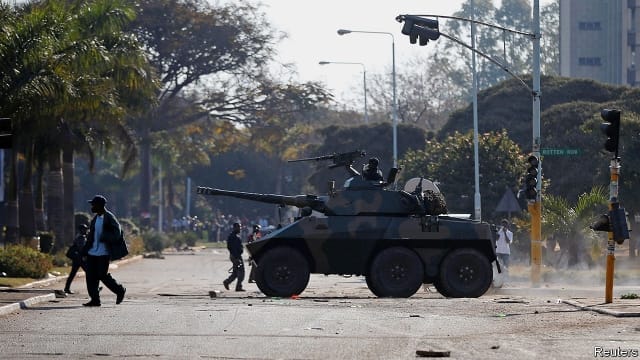
Zimbabwe’s elections turn violent
Army brutality and allegations of vote-rigging dash hopes of a new start
SO MUCH for a fresh start. The elections in Zimbabwe on July 30th were meant to usher in a new era for a country ruined by nearly four decades of misrule by Robert Mugabe. But the vote and its aftermath have showcased an all-too-familiar mix of chicanery and violence on the part of Zanu-PF, the ruling party, and its military backers. After toppling Mr Mugabe in a bloodless coup in November and promising a clean election, they have returned to form. And in doing so they have thrown into jeopardy their plans to end Zimbabwe’s pariah status.
The week began peacefully enough. Under the gaze of observers from three continents, election day was the most orderly in recent memory. As soon as counting began, however, the MDC Alliance, the main opposition bloc, complained that the vote was rigged. On August 1st thousands of its supporters flocked to downtown Harare, claiming that their leader, Nelson Chamisa, had won the presidential race.
Some protesters set fire to tyres and pulled down posters of President Emmerson Mnangagwa, the leader of Zanu-PF. Mr Chamisa has been irresponsibly claiming a colossal victory for weeks, whipping up his supporters. But the response by security forces was brutally disproportionate. At first police dispersed MDC supporters using water cannons and tear gas. Then, as armoured vehicles rolled into Harare and military helicopters whirred overhead, soldiers beat and shot those in the way. Three people were killed.
For Zimbabweans these scenes stirred memories of 2008, when the ruling elite rigged the presidential vote to prevent an MDC victory, before unleashing a campaign of murder and torture. A repeat on that scale seems unlikely. But the violence is a sign that “the New Dispensation”, as Mr Mnangagwa calls his post-Mugabe regime, looks a lot like the old one.
Not that this should come as a surprise. For weeks local human-rights groups, and American and European observers, have warned that Zanu-PF was again trying to rig an election. An hour or so before violence broke out, Elmar Brok, the chief EU observer, listed the ways in which Zanu-PF had sought to sway the vote, from handing out food, seed and fertiliser in rural areas to threats of violence. “A truly level playing field has not yet been achieved,” he noted.
Observers declined to estimate the influence of these practices on the final results. As The Economist went to press the Zimbabwe Electoral Commission had announced that Zanu-PF won 144 out of the 210 contested seats in the National Assembly (with three outstanding). Tallies from the separate presidential ballot had not been released.
These results raise a question. If victory seemed in sight, why did the government resort to violence? For some it is a sign that Mr Chamisa may be the rightful winner. For others it reflects growing divisions between the army and ruling party. The simplest answer might be that this is the natural reaction of a regime steeped in blood.
Whatever the reason, the consequences may be far-reaching. Although Western observers had already seemed hesitant to endorse the fairness of the election, those from the African Union and the Southern African Development Community appeared minded to give it a pass. But dead protesters make it hard for all but the blindest observer to say that this election shows that Zanu-PF has changed.
And it puts Mr Mnangagwa, should he triumph by foul means or fair, in something of a bind. An orderly election was supposed to be the first hurdle cleared on the path to getting loans from the IMF (which, in turn, would be a signal to other creditors). But even if his government now embarks upon IMF-friendly economic reforms, the chaos of the election makes it more difficult for America and the EU to support IMF loans.
Lining up to vote on July 30th, Munyaradzi Sibanda, a 35-year-old security guard from Harare, noted that his pay had been flat for eight years while prices in the shops kept rising. He cycles two hours to and from work every day to save on transport costs. He gets back just in time to see his children for ten minutes before they go to bed. “We just need change,” he says. Sadly, there seems little on the way
